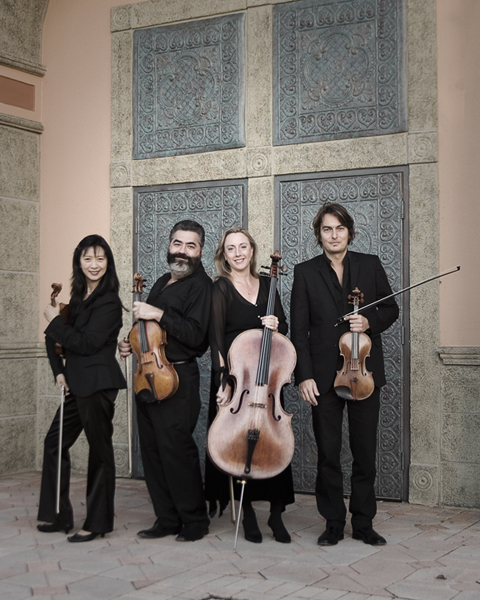Dvorak shines brightest in Delray Quartet opener
 It’s not for nothing that the twelfth string quartet published by Antonin Dvorak is one of the most popular works in the entire genre.
It’s not for nothing that the twelfth string quartet published by Antonin Dvorak is one of the most popular works in the entire genre.
Few string quartets can boast the same combination of sheer tuneful richness and straightforward structure as the so-called American quartet (in F major, Op. 96), and the audience on hand Sunday afternoon for the first concert of the Delray String Quartet’s fifth season let the foursome know that with a cheering standing ovation after their performance of the work.
This repertory staple is also featured on the quartet’s first recording, which was available at the performance in the music room of the Colony Hotel in downtown Delray Beach. An all-Dvorak offering in which the American is coupled with the A major Piano Quintet (with pianist Tao Lin), the record marks another milestone for the group, which arose out of the rubble left behind in the collapse of the Florida Philharmonic.
But the Delrays are still a work in progress, though two of the members have been playing in the quartet since its debut. While the group as a whole plays in keeping with the aggressive, broad-strokes emotionalism of first violinist Mei Mei Luo, so that the Delray sound is one of big, bright colors, wide dynamic range and flexible tempi, consistent unity of ensemble remains elusive, an aspect that was most evident in the first work on Sunday’s program, the Hunt Quartet (No. 17 in B-flat, K. 458) of Mozart.
And here it was at the most exposed moments where things weren’t precise: The recapitulation of the opening theme in the first movement, after an ill-advised ritard, and again at the recap of the main theme in the slow third movement, as Luo brought the elaborate aria-like figurations of the main melodic line in for a landing at the airport of E-flat, only to find that everything wasn’t lined up for it. Although these are minor imperfections, when considering the overall performance, they’re also the kind of details that the finest quartets always get right.
Still, it was generally an engaging performance of this canonical Mozart work. In the third movement, Luo and guest cellist Claudio Jaffe, filling in for Susan Moyer Bergeron, traded the parts of the Adagio song they share beautifully, Jaffe echoing Luo seamlessly so that their phrases had a gratifying continuity of melodic line. The three speedier movements had a cheerful, sprightly quality to them, though in the first movement the secondary theme slowed down too much, draining the forward energy, and in the second, the trio was a good bit peppier than the minuet itself.
The finale also had a fine basic sound and feel, but it lacked a certain sense of razzle-dazzle that Mozart liked to write into these closing movements. The music works better when there’s a sense of surprise and catch-me-if-you-can, but the Delray reading was too flat-footed, without the sense of joy and high spirits that makes this piece such fun to listen to.
The Dvorak quartet, which occupied the second half of the program, was much better ensemble-wise, undoubtedly because Luo, second violinist Laszlo Pap and violist Richard Fleischman have spent a lot of time on the piece in the recording studio. From the opening theme, announced by Fleischman’s unusually large viola sound, to the final F major triads at the end, there was a strong sense of purposeful unity that ebbed and flowed with the narrative of the music.
The famous slow movement also saw some lovely music-making in the way Luo and Jaffe handled the celebrated mournful theme, playing it with the full complement of late Romantic emotional nakedness. I don’t agree with the choice here of the mordent in the main theme played stretched out instead of rapidly, like a glimmer, but at least it was consistently followed throughout.
After the enthusiastic response for the Dvorak, the Delrays offered an encore, an arrangement by William Zinn of Bess, You Is My Woman Now, the great Act II duet from George Gershwin’s opera, Porgy and Bess. Bluesy and thoroughly American though it is, it’s also late Romantic music at heart, and the quartet played it accordingly.
Oboist John Dee will join the Delray String Quartet for its next performance at 4 p.m. Sunday, Jan. 4, 2009, at the Colony Hotel in downtown Delray Beach. On the program are the Oboe Quintet in D minor, K. 406, of Mozart and the String Quartet No. 2 of Borodin. Tickets are $35. Call 561-213-4138.
Greg Stepanich has covered classical music, theater and dance for 25 years at newspapers in Illinois, West Virginia and Florida. He worked for 10 years at The Palm Beach Post, where he was an assistant business editor and pilot of Classical Musings, a classical music blog. He now blogs for the Palm Beach ArtsPaper at www.pbartspaper.com and has a personal blog at classicalgreg.wordpress.com. He also works as a freelance writer and composer.
Posted in Performances
Leave a Comment
Mon Dec 15, 2008
at 2:56 pm
No Comments





